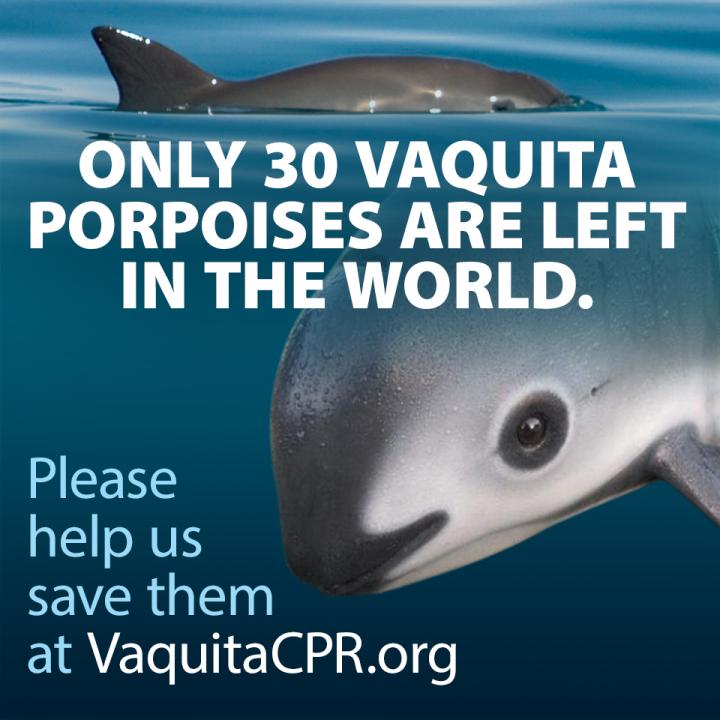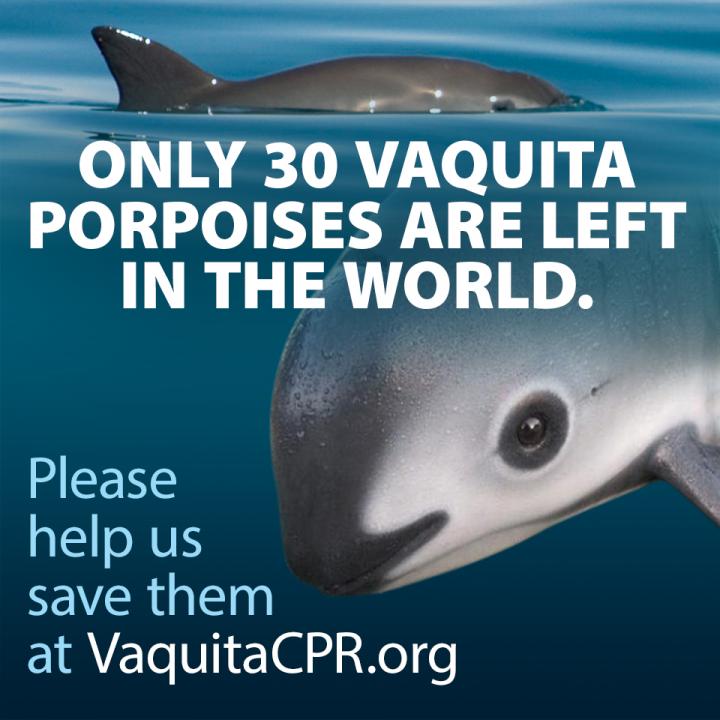
Credit: VaquitaCPR
The world is marking International Save the Vaquita Day on July 8 by supporting VaquitaCPR's ambitious, emergency plan to help save the vaquita porpoise from extinction in the northern Gulf of California. The project, which has been recommended by the International Committee for the Recovery of the Vaquita (CIRVA), involves relocating some of the remaining vaquitas to a temporary sanctuary later this year. At the same time, a permanent ban on gillnet fishing went into effect last week in a bid to save a critically endangered species of porpoise. VaquitaCPR is led by the Mexican government and supported by a consortium of marine mammal experts from more than a dozen organizations around the world.
The plight of the vaquita continues to gain increasing attention after actor Leonardo DiCaprio, Mexican President Enrique Peña Nieto and Mexican billionaire Carlos Slim signed a Memorandum of Understanding recently committing Mexico to strengthen its legislations surrounding fishing practices.
July 8 is International Save the Vaquita Day, a day marked by events designed to raise awareness of the world's most endangered marine mammal.
"This is historic. We're seeing extraordinary partnerships being forged on common ground – a shared desire to rescue the vaquita from extinction. But we must act quickly," said Dr. Cynthia Smith, Executive Director of the National Marine Mammal Foundation. "International Save the Vaquita Day is an opportunity for people to join the fight for the vaquita's life by learning how to support our rescue plan at VaquitaCPR.org. It takes a global village to save a species."
VaquitaCPR (Conservation, Protection and Recovery) is an emergency action plan of the Mexican government with the input of an expert group of conservation scientists and marine mammal veterinarians. Recovery operations are set to begin in Mexico in the next few months. The plan acknowledges the many uncertainties involved in finding, catching and maintaining vaquitas in a temporary sanctuary. Vaquitas are not only rare, they avoid motorized vessels and no one can predict how they will react. "Unlike condors, we expect that most vaquitas will remain in the wild as capturing even a few will be very difficult," says Dr. Lorenzo Rojas-Bracho, lead vaquita researcher and head of CIRVA. "Having some is still better than having none. The decline is happening faster than solutions for illegal fishing, so we need to have multiple strategies."
The emergency action plan has been adopted by Secretaría de Medio Ambiente y Recursos Naturales (SEMARNAT) on the recommendation of their expert advisory group, the Comité Internacional Para La Recuperación De La Vaquita (CIRVA). Under SEMARNAT leadership, the National Marine Mammal Foundation, The Marine Mammal Center, and the Chicago Zoological Society will help coordinate the efforts of a multi-institutional, international conservation team.
The precipitous decline of the vaquita has been primarily driven by accidental deaths of the porpoises in fishing gillnets. In 2015, the Mexican government instituted a two-year gillnet ban over the range of the vaquita. Additionally, the Mexican government implemented a financial compensation program to provide income to fishermen affected by the two-year gillnet ban. Despite strong enforcement, illegal gillnets are still being set to catch an endangered fish known as totoaba, the swim bladders of which fetch large sums of money on Hong Kong and Chinese black markets. Thus, despite tens of millions of dollars invested by the Mexican government in preventing vaquita by-catch, the population continues to decline.
###
VaquitaCPR is an international conservation program led by SEMARNAT in coordination with the National Marine Mammal Foundation, The Marine Mammal Center, and the Chicago Zoological Society. Key collaborators in Mexico include Instituto Nacional de Ecología (INECC), Asociación Mexicana de Hábitats para la Interacción y Protección de Mamíferos Marinos (AMHMAR), and Acuario Oceanico. United States collaborators include Duke University and the U.S. Marine Mammal Commission, with the National Oceanic and Atmospheric Administration contributing technical support. European collaborators include Dolfinarium Harderwijk, Aarhus University, and Fjord&Baelt. Additional support and expertise has been offered from Dolphin Quest, SeaWorld, and the Vancouver Aquarium. VaquitaCPR operates as a private and public partnership, relying on both individual donors and government grants. VaquitaCPR has received generous financial support from the Mexican government, Association of Zoos and Aquariums, Global Wildlife Conservation, Alliance of Marine Mammal Parks & Aquariums, Africam, International Marine Animal Trainer's Association, Waitt Foundation, Disney Conservation Fund, and the Firedoll Foundation. For information about the plan, visit http://www.VaquitaCPR.org.
Media Contact
Steve Walker
[email protected]
@NMMF.org





